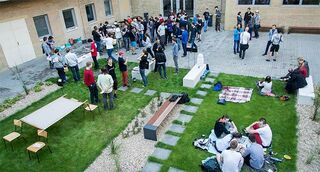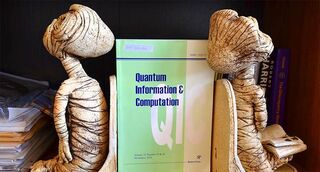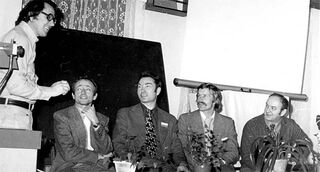Degree programme objectives
The study of theoretical computer science focuses on a deeper understanding of basic principles underpinning the development of contemporary information technologies, including non-classical computational devices such as neural networks or quantum computers. Together with the active mastering of advanced theoretical as well as practical concepts, a special emphasis is put on the development of abstract thinking. The students gain a deeper understanding of advanced algorithms, principles of modern programming languages, and methods for verification and analysis of computer programs. Further, they understand the basic advantages and limitations of non-classical computational devices. After successfully completing the programme, the students are qualified for a wide variety of positions requiring complex expert skills.
Study plans
Studies
- Objectives
The study of theoretical computer science focuses on a deeper understanding of basic principles underpinning the development of contemporary information technologies, including non-classical computational devices such as neural networks or quantum computers. Together with the active mastering of advanced theoretical as well as practical concepts, a special emphasis is put on the development of abstract thinking. The students gain a deeper understanding of advanced algorithms, principles of modern programming languages, and methods for verification and analysis of computer programs. Further, they understand the basic advantages and limitations of non-classical computational devices. After successfully completing the programme, the students are qualified for a wide variety of positions requiring complex expert skills.
- Learning Outcomes
After successfully completing his/her studies the graduate is able to:
- estimate computational resources needed to solve a problem; evaluate possible approches to solving a problem and identify an appropriate methodology
- identify a programming language and data structures apt for implementing a given system
- apply the techniques for formal verification and analysis of computer programs
- evaluate potential benefits of using non-classical computational devices for solving a given problem
- Occupational Profiles of Graduates
After successfully completing the study programme, the students are qualified for a variety of IT positions including a developer, system architect, or verification engineer. Solid mathematical skills together with deep knowledge of non-trivial algorithms enable the students to find jobs in the financial sector. The acquired knowledge and skills may be well used also in the follow-up Ph.D. programme.
- Practical Training
The practical training in not an obligatory part of the study program.
- Goals of Theses
The goal of Maters's thesis is to demonstrate that student is capable of working on a project of non-trivial size (e.g. to create a useful application, or to formulate and prove advanced mathematical thesis), as well as to demonstrate the capability of presentation and positioning of the results in the context of actual state-of-the-art in the field. Bachelor's thesis is expected to be written in Czech, Slovak or English language. Expected structure of the work includes declaration of the author about the thesis being a school work, declaration of authorship, contents, the proper text, and references. Minimal expected scope of the work is 40 regular pages of the proper text (including illustrations).
- Access to Further Studies
After completion of the Master's studies, it is possible to continue further studies in a Doctoral degree programme (after satisfying the admission requirements).


